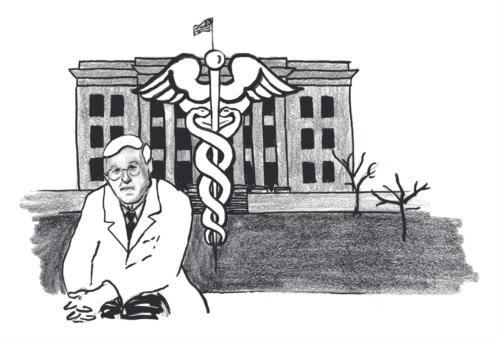
News
Harvard Quietly Resolves Anti-Palestinian Discrimination Complaint With Ed. Department

News
Following Dining Hall Crowds, Harvard College Won’t Say Whether It Tracked Wintersession Move-Ins

News
Harvard Outsources Program to Identify Descendants of Those Enslaved by University Affiliates, Lays Off Internal Staff

News
Harvard Medical School Cancels Class Session With Gazan Patients, Calling It One-Sided

News
Garber Privately Tells Faculty That Harvard Must Rethink Messaging After GOP Victory
The View From the Medical School

It has been a privilege to serve as Dean of the Faculty of Medicine over these past ten years. I feel gratified looking back on what has been accomplished and feel confident that the School is poised to continue its remarkable trajectory.
Looking ahead, the singular opportunity that will define the next deanship of Harvard Medical School (HMS) is its engagement with the University and the affiliated hospitals in new science-planning initiatives.
HMS has a long history of innovative science, from the formation of the Institute of Chemistry and Cell Biology ten years ago to the more recent establishment of the Department of Systems Biology. New initiatives in structural and chemical biology, as well as a burgeoning program in neuroscience have kept HMS at the cutting edge. We have also helped develop new graduate programs in chemical biology and systems biology, a new social sciences track within the MD-PhD Program, and initiated an innovative MD-MBA Program. HMS and the hospitals were strongly supportive of the establishment of the Broad Institute and the formation of a new interfaculty Department of Developmental and Regenerative Biology. The Allston campus expansion and the opportunity to develop new programs on the Longwood campus will allow these programs to flourish and encourage creation of other new initiatives.
The opportunities for evolution of these Harvard-wide interactions necessitate a very broad analysis that includes activities in the social sciences, health policy, and global health. Relationships between all the schools and these programs, in particular HMS, the School of Public Health, the Business School, and the Kennedy School, need renewed evaluation.
It is difficult to project or predict the outcome of these efforts. We have recently initiated a series of discussions between hospital-based academic leaders and our basic science chairs. The meetings have been informative and discussions productive. It is essential that they continue. And they ought to extend to more tangible planning efforts with the other schools at Harvard. It is the objective of the newly created Harvard University Committee on Science and Engineering to assess and define various options in this regard. I am pleased to see that the Medical School and the hospitals are well-represented on the committee’s membership.
It is appreciated that integration of planning efforts must benefit all parties involved in the discussions regarding the future of Allston, the Longwood Quad, and the hospitals. Everyone has agreed that bold plans focussing on new initiatives in education and integrating interdisciplinary research are critical to our success. It should be emphasized that many of our faculty members currently teach courses at Harvard College and many science-oriented students carry out research projects in the laboratories of the medical school. The continuation of this planning initiative will be crucial in setting out the anchor activities to be placed at the Allston site.
Dr. Joseph B. Martin is stepping down this summer after 10 years as dean of Harvard Medical School.
Want to keep up with breaking news? Subscribe to our email newsletter.
